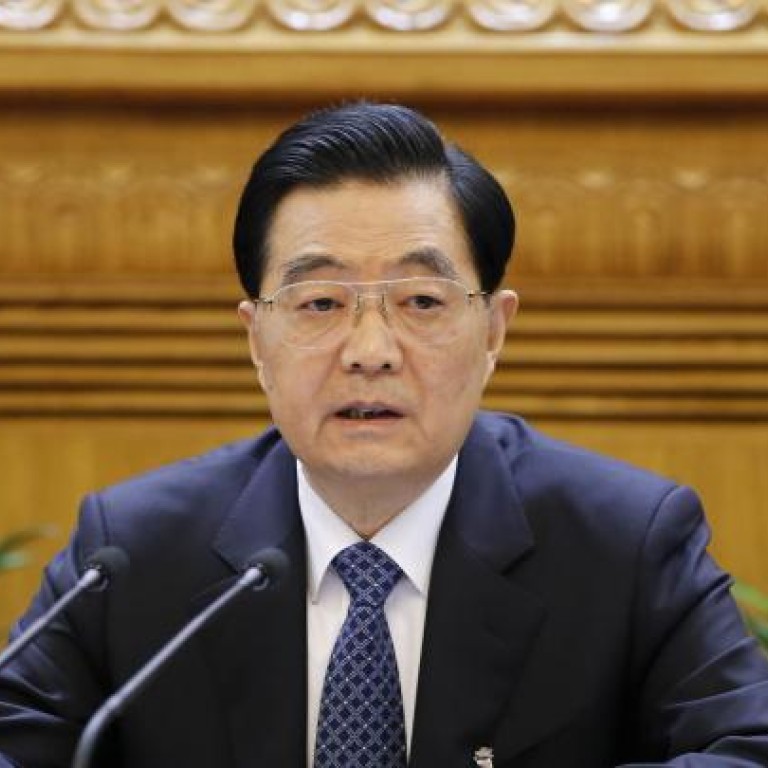
China's 2020 goal may fail unless core issues are tackled, say analysts
Hu's goal of doubling nominal earnings by 2020 doesn't address wealth distribution, analysts say
While Hu Jintao's goal of doubling per capita income by 2020 is seen as a sign Beijing is paying attention to the poor, analysts said achieving it may not narrow the wealth gap if other, deep-rooted problems remain unsolved.

Still, the effort could fall flat if Beijing fails to take additional steps to correct the way wealth is distributed, economists said.
"If the systematic problems aren't corrected, it would be hard to double income," Yale University finance professor Chen Zhiwu said, though Hu's plan was still "a step forward".
Chen said Beijing's leaders must cut taxes, loosen market controls, level the playing field for private businesses and give more chances for ordinary people to increase their wealth by buying property and making investments. Overbearing government control in areas such as land and market access would be "a deadly obstacle", he said.
In recent years, some Chinese academics, including Su Hainan, a researcher at the Labour and Wage Institute of the Ministry of Human Resources and Social Security, have said Beijing must learn from Japan's "income-doubling plan" in the 1960s. Japanese prime minister Hayato Ikeda introduced a series of steps, including interest rate and tax reductions, to boost spending and fuel much of the economic boom associated with Japan's miracle rise in the decades after losing the second world war.
It is unclear if Hu is charting a similar path as he prepares to hand over control of the country. But any such effort would be more difficult in China, where a lack of reliable income data obscures how wealth is distributed.
The rising wealth of China's tycoons and state-sector executives has little to do with wage increases. They get various bonuses and subsidies; some get payments as a result of their connections with the government.
This grey income goes largely unreported, making it difficult to calculate the true income of the rich and almost impossible to gauge the income gap. Citing incomplete data, the National Bureau of Statistics stopped publishing an official Gini coefficient, a statistical measure of income distribution, years ago.
Shao Ning, the deputy chairman of the state-owned Assets Supervision and Administration Commission (Sasac), said a lack of income distribution data hindered reform.
"If we can't get good information about that, it would be very hard to find an accurate entry point [for reform]," Shao said. It would be hard to counter the pushback from state-run enterprises, which would be a major target of any redistribution drive.
For now, it is much easier for Beijing leaders to simply boost people's nominal income, analysts say. Hence, Hu's 2020 goal. That would require average annual income growth of only 7 per cent over the next decade, according to Everbright Securities analyst Xu Gao.
Moreover, said Chen, China may have trouble boosting income growth over the next decade, in part because the benefits of entry into the World Trade Organisation in 2001 are fading.
Also, urbanisation could slow down unless Beijing removes the barriers that prevent migrant workers from moving to cities, such as the household registration system, Chen said.
Hu's report touched on many general points, such as improving the way resources are allocated, reforming the system and expanding SOE reforms, but he provided little detail.
National Development and Reform Commission deputy leader Zhu Zhixin said an income distribution reform plan was being drafted. His statement suggested reforms would not be drastic in the near term, saying the income distribution system would be adjusted "based on China's national conditions and basic stage of development".
The reform of income structure has been delayed for years, largely owing to opposition from the state sector, experts say.
Sasac Chairman Wang Yong said at the party congress gathering last week said that even in economies seen as freer, state-owned enterprises account for a big portion of the economy, such as Singapore's Temasek.
"A priority of the new incoming government will be to manage the impact of the SOEs in the domestic economy," said Dr Martyn Davies, CEO of Frontier Advisory. "They have now reached their peak of influence."

